How Much Does an African Safari Cost?

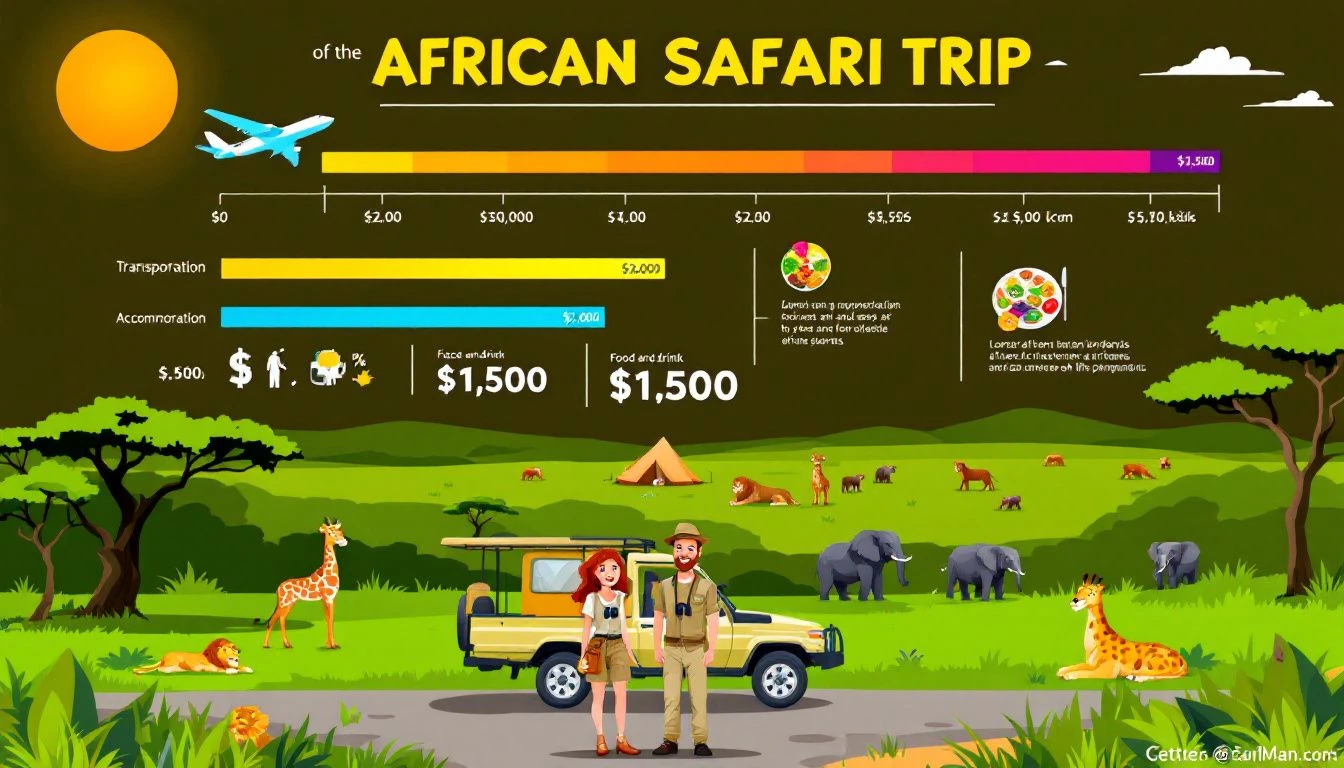
Key Takeaways
Safari costs vary widely based on destination, season, duration, and accommodation type, with East Africa generally being more expensive than Southern Africa.
Budget-friendly safaris average €150 per night, while luxury safaris can exceed €1,450 per night, significantly impacting overall trip expenses.
Strategic planning, such as timing the trip during off-peak seasons and booking through reputable tour operators, can enhance the safari experience while managing costs.
Understanding African Safari Costs
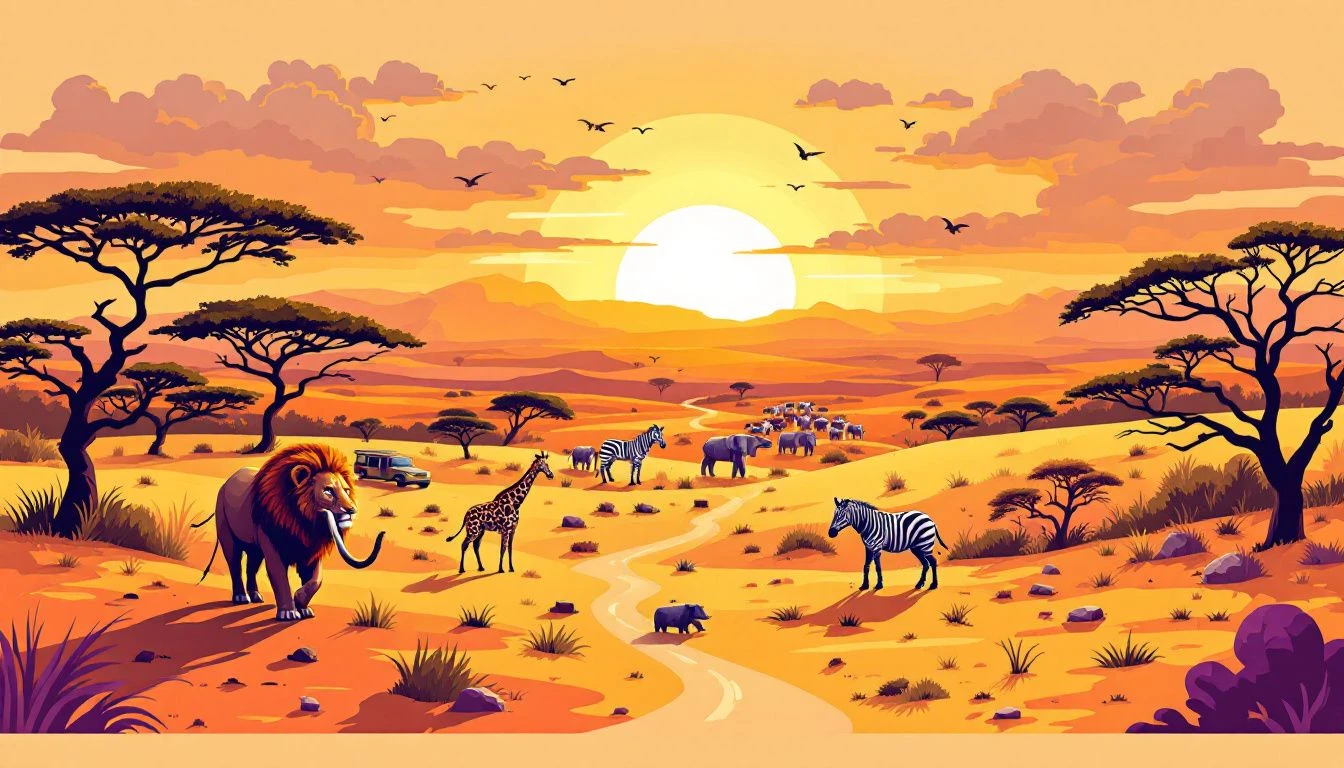
The cost of an African safari can vary widely based on several key factors. Destination is a major determinant, with East Africa (Kenya and Tanzania) often being more expensive than Southern Africa (Botswana and South Africa) due to currency differences and the quality of experiences offered. The duration of your stay also plays a significant role; longer trips may reduce the per-day cost but increase the overall expense. Accommodation types range from budget campsites to luxury lodges, each offering different amenities and experiences.
Seasonal variations can significantly impact prices. Traveling during peak seasons, such as the Great Migration in Kenya and Tanzania, generally costs more due to higher demand. On the other hand, off-season travel can provide substantial savings and a more intimate safari experience. Understanding these factors is crucial for planning an African safari that fits your budget and meets your expectations.
Average Cost of an African Safari Per Person
Knowing the average costs per person helps set realistic expectations when planning an African safari. A budget-friendly safari typically costs around €150 per night, translating to an overall african safari trip cost of $3,000 to 5,000 for a 10-day trip. These safaris often involve shared group experiences and basic accommodations, allowing you to enjoy the wildlife without overspending. Understanding African safari prices can further aid in budgeting for your adventure.
Mid-range safaris, which offer more comfortable lodgings and additional amenities, average around €350 per night. For a 10-day safari in East Africa, you can expect to spend between $3,000 and $6,000 per person. These trips might include guided tours, better meals, and enhanced wildlife viewing opportunities, providing a balanced blend of comfort and adventure.
Ultimate luxury safaris can cost over €1,450 per night, with total expenses exceeding $15,000 per person for a 10-day trip. These high-end experiences often feature exclusive lodges, private game drives, and personalized services, ensuring an unforgettable adventure.
Whether you choose a budget, mid-range, or luxury safari, understanding these price points will help you plan accordingly and make the most of your African safari trip.
Key Factors Influencing Safari Prices
Several critical factors influence the cost of an African safari, including accommodation types, seasonal variations, and the duration of stay. Each of these elements can significantly alter the overall safari costs, making it essential to consider them when planning your trip.
Luxury lodges offer unparalleled amenities and personalized services, but they come with a higher price tag compared to budget-friendly tented camps. Seasonal variations are also significant, with peak times like the Great Migration demanding premium prices.
Finally, the length of your stay can impact the total cost, with longer safaris potentially reducing the per-day expense. Considering these factors will assist in creating a safari budget that matches your expectations and financial capacity.
Accommodation Types
Accommodation choices can drastically affect your safari budget. Luxury lodges, often located in prime wildlife areas, offer exclusive experiences and top-notch amenities, but they come at a premium price. For instance, luxury safaris in Tanzania can start at around $350 per day, similar to current prices in Kenya. These lodges provide a high level of comfort and often include guided tours and meals.
On the other hand, tented camps offer a more traditional and often more affordable safari experience. They allow travelers to connect intimately with nature without the hefty price tag of luxury lodges. Budget-friendly campsites provide basic amenities and a closer-to-nature experience, which can be particularly appealing for those looking to save on accommodation costs.
Whether choosing luxury lodges or tented camps, accommodation types significantly impact overall safari costs.
Seasonal Variations
The season you choose for your safari can greatly influence the cost. Traveling during peak season, such as the Great Migration in the Serengeti or Masai Mara, typically results in higher prices due to increased demand. These peak times offer spectacular wildlife viewing but come at a premium cost. Conversely, visiting during the low or shoulder seasons can significantly reduce costs, sometimes by as much as 50%.
Off-peak travel not only saves money but also provides a more tranquil safari experience with fewer crowds. This can enhance your connection with nature and make your safari feel more exclusive. Strategically timing your trip can lead to significant savings and a more rewarding adventure.
Duration of Stay
The length of your safari can also impact the overall cost. While longer trips increase the total expenses, they often lower the per-day cost. A 10-day safari might be more economical on a per-day basis compared to a shorter, more intense safari.
Carefully planning the duration of your stay can help balance cost and experience, ensuring you get the most value from your trip.
Popular Safari Destinations and Their Costs
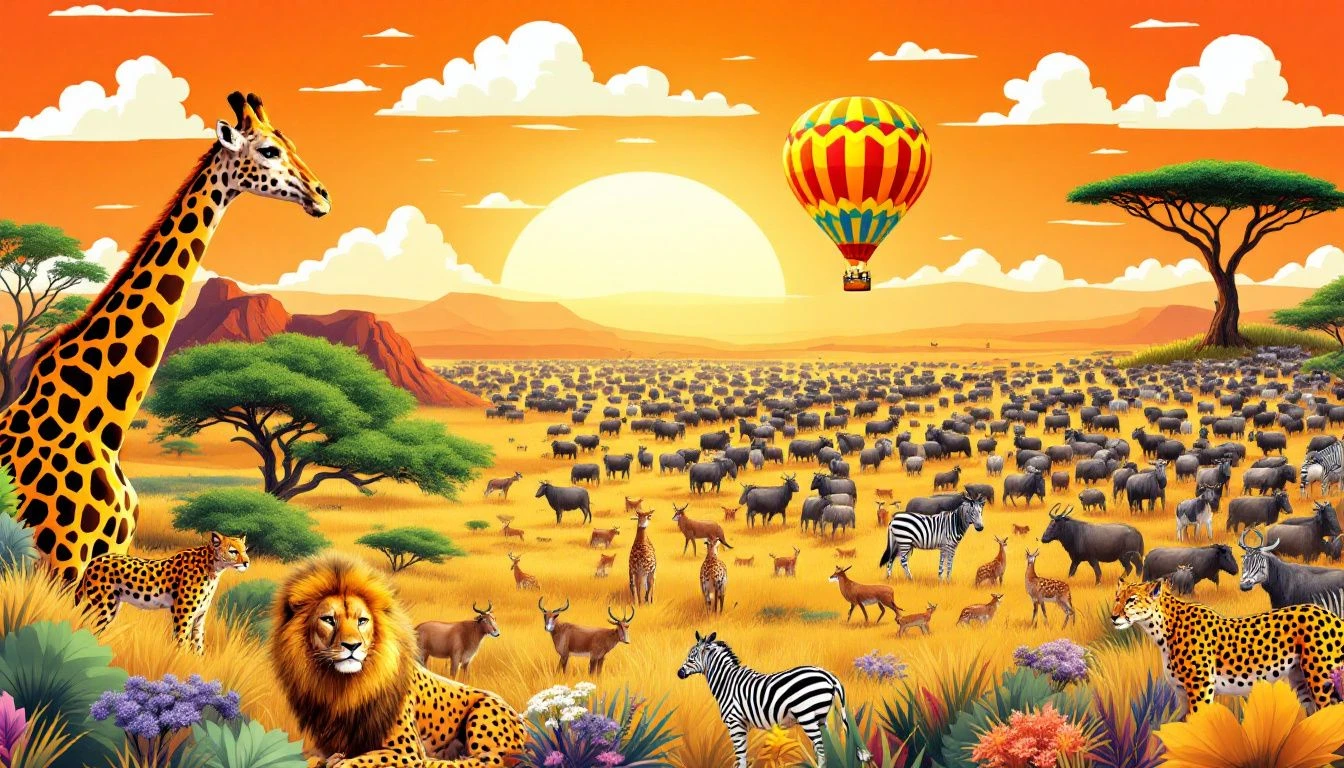
The choice of safari destination is a major factor in determining the overall cost. Popular major safari destinations like Kenya, Tanzania, and South Africa each offer unique experiences and varying price points. Kenya and Tanzania, both located in East Africa, are renowned for their breathtaking landscapes and rich wildlife, but they also tend to be more expensive. In contrast, South Africa often provides more cost-effective options, especially in well-known national parks like Kruger.
Knowing the specific costs associated with these destinations aids in choosing the best option for your budget and desired experiences. Each destination has its own set of attractions and costs, making it crucial to weigh these factors when planning your African safari holiday.
Kenya Safari Costs
Kenya is a prime safari destination, known for its stunning landscapes and diverse wildlife. However, as of July 2024, park entry fees in Kenya will see a significant increase, impacting the overall cost of safaris. A typical private safari in Kenya starts around $300 per person per day, including park fees and accommodation. Shared group safaris, which are more budget-friendly, can be as low as $180 per person per day, especially when opting for camping options.
To get the best deals, consider booking through local tour operators, who often have better on-ground connections and access to exclusive offers. Utilizing a reputable tour operator can not only provide better rates but also ensure a smoother and more enjoyable safari experience.
Tanzania Safari Costs
Tanzania, often regarded as the birthplace of safari, offers some of the most iconic wildlife experiences in East Africa. A 14-day luxury safari in Tanzania costs around $7,000, providing an immersive experience in major parks like the Serengeti and Ngorongoro Crater. These parks significantly influence the cost due to their popularity and the high-quality experiences they offer.
While luxury safaris are more expensive, they provide unparalleled wildlife encounters and top-tier accommodations. For travelers on a tighter budget, more affordable options are available, allowing them to still enjoy the beauty and wildlife of Tanzania through walking safaris without overspending.
Comparing costs and amenities across different safari packages can help you find the best value for your African safari trip.
South Africa Safari Costs
South Africa is known for offering more cost-effective safari options, particularly in national parks like Kruger. The park entry fee for Kruger National Park is $30 per day, making it a budget-friendly option. In contrast, private concessions within South Africa tend to be pricier but offer a more exclusive and tranquil experience.
Safaris in South Africa can vary widely in cost depending on whether you choose a national park or a private reserve. National parks generally cost less and are more accessible, while private reserves provide a more personalized and secluded experience. Weighing these options can help you decide which type of safari best fits your budget and preferences.
Additional Costs to Consider
Beyond the primary safari costs, several additional expenses need to be considered. These include international and domestic flights, park entry fees, and travel insurance. These costs can add up quickly, so it’s important to budget for them in advance. Other expenses, such as tips, personal items, and optional activities like hot-air balloon rides, should also be factored into your overall safari costs.
Recognizing these additional costs helps create a more accurate and comprehensive safari budget. Proper planning ensures that there are no financial surprises, allowing you to fully enjoy your safari experience without any stress.
International and Domestic Flights
The cost of international flights to Africa typically ranges from $600 to $1200, depending on the season and booking time. Strategies to reduce these costs include booking early and avoiding travel during peak times like school holidays. Domestic flights within Africa generally cost between $200 to $400 per leg, adding to the overall expenses.
To minimize flight costs, consider using multiple airlines and possibly transiting through a third country instead of flying direct. These strategies can lead to significant savings, making your safari more affordable without compromising the experience.
Park Entry Fees and Permits
National park entry fees are another important consideration. For example, the fee for Tanzania’s Serengeti National Park is $80 per day, while South Africa’s Kruger National Park charges $30 per day. Some parks also impose additional conservation fees, which can further increase costs.
Special permits, such as those for gorilla trekking in Rwanda, can be quite expensive, with fees reaching $1500. These additional costs should be factored into your budget, especially if you plan to engage in unique activities that require special permits.
Travel Insurance and Vaccinations
Travel insurance is essential for any African safari, covering unforeseen events such as health emergencies and trip cancellations. The cost of travel insurance varies but is a necessary investment for peace of mind during your trip. Vaccinations are also crucial, protecting against diseases like yellow fever.
Accounting for these expenses ensures preparation and protection during your safari. Adequate insurance and vaccinations allow you to focus on enjoying your adventure, knowing you have taken the necessary precautions for a safe and enjoyable trip.
Tips for Budgeting Your African Safari
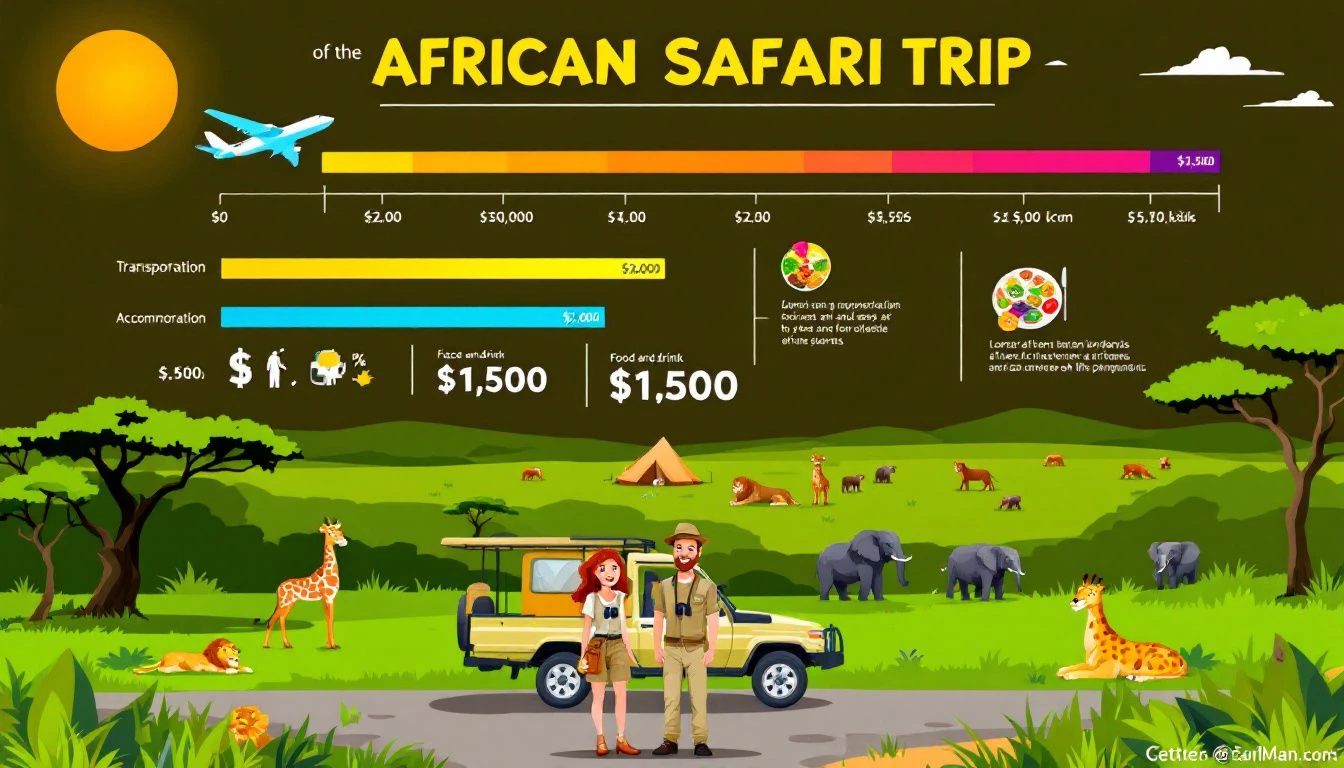
Effective budgeting for an African safari involves careful planning and consideration of various factors. Here are some key points to keep in mind:
Choose the right time to travel to take advantage of lower prices and better wildlife viewing opportunities.
Book through reputable tour companies to ensure quality service and avoid hidden costs.
Understand the differences between tailor-made safaris and package deals to optimize your budget.
Strategic planning can help you manage costs without sacrificing the quality of your experience.
By following these tips, you can create a safari budget that allows you to enjoy an enriching and memorable adventure without overspending. Proper budgeting ensures that you get the most value from your trip, making your dream safari a reality.
Choosing the Right Time to Travel
Selecting the right season for your safari can lead to substantial savings. Traveling during the low or shoulder seasons can significantly reduce costs, sometimes by as much as 50%. These times also offer a more tranquil experience, with fewer crowds and a closer connection to nature.
Avoiding peak seasons and school holidays can help lower costs for international flights and accommodations. Planning your travel dates strategically ensures a more affordable and enjoyable safari experience, allowing you to make the most of your adventure.
Booking Through Tour Companies
Booking with established tour companies offers significant benefits, including convenience and potential cost savings. Reputable safari tour operators often offer package deals that include accommodation, transportation, and activities, providing better overall value. These companies handle the logistics, making your trip smoother and more enjoyable.
The right tour operator maximizes your safari experience while keeping costs manageable. By leveraging their expertise and connections, you can access exclusive offers and ensure that every aspect of your trip is well-coordinated. This approach helps you make the most of your African safari holiday without unnecessary stress or expenses.
Tailor-Made vs. Package Deals
Tailor-made safaris offer a customized experience, allowing you to design an itinerary that fits your preferences and budget. These personalized trips can include specific activities and accommodations that enhance your enjoyment and potentially optimize costs. Tailor-made tours provide control over various aspects of the safari, ensuring it aligns perfectly with your expectations.
On the other hand, package deals are generally more straightforward and can sometimes offer better value by bundling services together. These packages may include additional activities and services that enhance the overall safari experience.
Whether you opt for a tailor-made safari or a package deal, understanding the benefits of each can help you make an informed decision that suits your needs and budget.
Is an African Safari Worth the Investment?
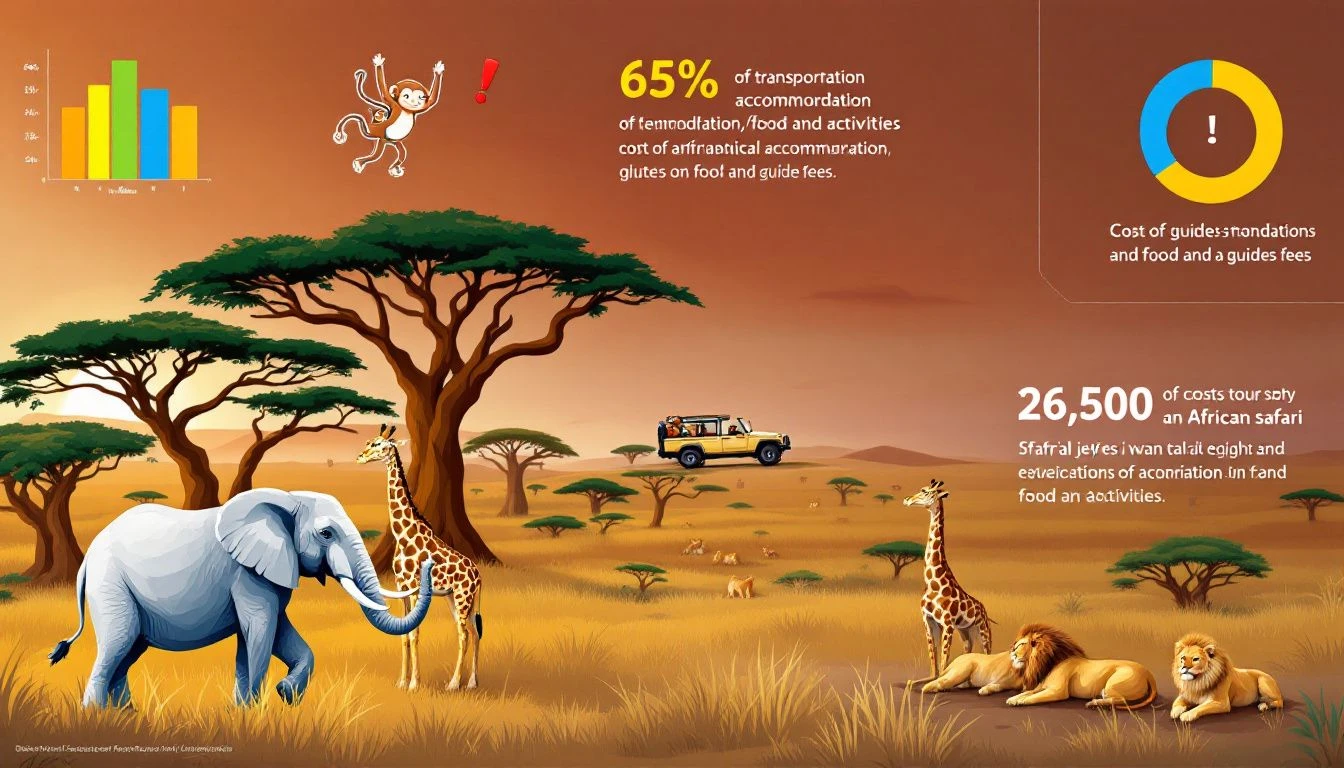
Many travelers find that the experiences and memories from an African safari justify the financial investment. The unique wildlife encounters, breathtaking landscapes, and cultural experiences provide a transformative adventure that is hard to replicate elsewhere. The emotional connection with nature and the thrill of seeing animals in their natural habitat can lead to personal growth and a deeper understanding of wildlife conservation.
An African safari is not just a trip; it’s a journey that enriches the soul and creates lasting memories. The investment in such an experience often outweighs the cost, as the benefits extend beyond the safari itself, enhancing well-being and reducing stress.
For those seeking a once-in-a-lifetime adventure, an African safari is undoubtedly worth every penny, especially when considering the allure to discover Africa through African safaris.
Summary
Planning an African safari involves understanding various cost factors, from accommodation and seasonal variations to additional expenses like flights and park fees. By carefully considering these elements and utilizing strategic budgeting tips, you can create a safari experience that fits your financial capacity while ensuring a memorable adventure. Whether you choose a budget-friendly trip or a luxury safari, the investment in an African safari is a gateway to unforgettable memories and a deeper connection with nature.
Frequently Asked Questions
How much is a 2 week trip to Africa from the USA?
A two-week trip to Africa from the USA typically costs between $2,500 to $10,000, depending on your travel style and preferences. Adjust your budget accordingly for a personalized experience.
How much does an African safari cost per person?
An African safari typically costs between $3,000 to $5,000 for budget options, $3,000 to $6,000 for mid-range experiences, and over $15,000 for luxury safaris. Choose based on your preferences and budget for an unforgettable adventure.
What factors influence the cost of an African safari?
The cost of an African safari is influenced by factors such as the destination, length of stay, accommodation type, and travel season. Additionally, expenses like flights, park fees, and optional activities can significantly impact the overall price.
Are there affordable safari options in South Africa?
Yes, affordable safari options are available in South Africa, especially in national parks like Kruger, which feature lower entry fees compared to private reserves.
How can I save money on international flights for my safari?
To save on international flights for your safari, book early, avoid peak travel seasons, and consider transiting through a third country instead of flying direct. These strategies can significantly reduce your travel costs.